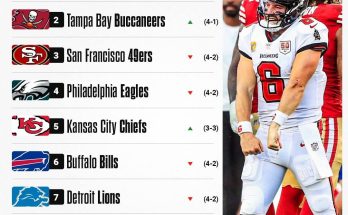There are games in sports that transcend their box score, that live in memory because of the weight of every pitch, every swing, every moment as if time itself had paused and watched. The 2025 ALDS Game 5 between the Detroit Tigers and the Seattle Mariners was that kind of game. A 15‑inning marathon, a winner‑take‑all playoff rubber match that stretched nearly five hours, testing arms, nerves, strategy, stamina, and hearts, it became an instant classic. What follows is the story of that night—the rhythms, the turning points, the agony and ecstasy—how it unfolded pitch by pitch, mound change by mound change, until Jorge Polanco’s walk‑off single ended it.
The stage was set: in a best‑of‑five, Game 5, win or go home. The Tigers and Mariners had battled hard to get there, and now only one would move on to the American League Championship Series. For the Mariners, this was their chance to break free of postseason heartbreak and reach the ALCS for the first time since 2001. For the Tigers, it was about seizing a moment, making a run, proving that this reconstruction had arrived. The energy in T-Mobile Park crackled with expectation and tension.
Detroit entrusted the ball to Tarik Skubal, their ace, and he delivered a MasterClass early. Over six innings he struck out 13 batters while giving up just one run on two hits. His fastball rattled off the radar guns, and for a stretch, he was untouchable—a force. He even notched a postseason record for strikeouts in a winner‑take‑all game. But in baseball, a pitcher only controls so much. Eventually, you have to hand off the baton. (WDIV)
Seattle, meanwhile, leaned on George Kirby, and the two starters set the tone. Through five innings, the Mariners held a fragile 1‑0 lead. Josh Naylor delivered the offense early, doubling and stealing third, then scoring on a sacrifice fly by Mitch Garver, which became the only run they would manage against Skubal. The early punch came, then silence. (MLB.com)
By the sixth, Detroit struck back. The Mariners brought in reliever Gabe Speier, and Kerry Carpenter launched a two‑run homer, giving Detroit a 2‑1 edge. Carpenter, having already proven his power earlier in the postseason, now gave the Tigers life. It was the moment when hope roared, “Maybe we can do this.”
But Seattle would not be silenced. In the seventh, with their season in jeopardy, they rallied. Manager A.J. Hinch had to mix arms, deploy bullpen depth. The tie came via Leo Rivas, pinch‑hitting in his first playoff at‑bat (on his birthday, of all days). He singled to left, scoring a run and drawing the Mariners back even. The tone shifted: this was going to be a night of attrition. (Reuters)
From there, both bullpens took over, and the game dug deeper. It was no longer about offense so much as defense, stamina, facing pressure, staying fresh, mixing pitches, avoiding the big mistake. Managers gambled, arms were stretched, and every hit seemed to carry enormous consequence. The scoreboard stayed stubborn, 2‑2, inning after inning.
They crossed the 10th, 11th, 12th, heading into the 13th. Detroit had chances. In the 12th and 13th, Seattle grounded into inning‑ending double plays, each time when the potential breaking run threatened to cross. The Tigers left runner after runner stranded—painfully, heartbreakingly. The Mariners, unflinching, held. Every time Detroit leaned, Seattle answered. The crowd waited, silent, in awe and dread at once. (The Washington Post)
In the 13th, one call proved controversial: Torkelson took a called strike three that fans and analysts later argued was off. The Tigers sensed they might have been robbed. Jack Flaherty entered for Seattle in relief and walked multiple batters. But he induced a double play that ended the inning. Against the odds, Seattle survived. That moment felt emblematic: one questionable call, one key double play, survival. (Bless You Boys)
Into the 14th and then the 15th they marched. Fatigue crept in; arms shook faintly, heads drooped, legs slowed. The fans, players, and broadcasters spoke less, held their breath more. Detroit failed to capitalize again in the 14th; Seattle answered with quiet defensive composure. The strategies became chess at 2 a.m.—when to bring in fresh arms, when to challenge a call, when to roll with what you have.
Then, in the bottom of the 15th, with hope and dread tangled, it all came down. J.P. Crawford led off with a single. Then Randy Arozarena was hit by a pitch. Cal Raleigh flied out, but the runners advanced. Julio Rodríguez was intentionally walked, loading the bases with one out. The tension was unbearable. Detroit brought in reliever Tommy Kahnle. The count ran full. In that 472nd pitch of the game, Jorge Polanco yanked a changeup into right field. Crawford scored. The Mariners erupted. Game over, 3‑2. (Reuters)
It was the longest winner‑take‑all postseason game in Major League Baseball history by innings (15) and in real time (4 hours, 58 minutes). (ESPN.com) Over both teams, 15 pitchers were used. They threw a combined 472 pitches. They struck out 37 times. They stranded 22 runners across extra innings. (ESPN.com) Mariners’ pitchers threw fewer (209) to Detroit’s roughly 263. (SI) The game also made history: Seattle became the first team to have multiple pitchers make their first career relief appearance in the same postseason game. (ESPN.com)
Polanco’s hit was hardly glamorous—a liner into the infield gap—but in that moment, nothing needed to be flashy. It needed to be enough. He became the hero, his name etched forever in playoff lore. And it was the kind of ending that spoke not just to skill, but to sheer will. (Reuters)
In Detroit, heartbreak. Their season ended in gutting fashion after a performance of boldness and grit. For the Tigers, Skubal will be remembered for his brilliance; Carpenter for his clutch homer; the bullpen for hanging in deep into the night. But the margin was thin, the swings small, the luck ephemeral. They played valiantly and came within a hit of victory. Many of their fans stayed until the end, numb, applauding effort even in defeat.
For the Mariners, this was catharsis. A 24‑year drought ended. A city long starved for postseason joy exhaled. It was a statement: that in the chaos and exhaustion and strain, they could still find a way. Manager Dan Wilson spoke of fight; he called it 15 rounds, an analogy to boxing more than baseball. His team answered. Polanco grinned. The bullpen may have carried the heavy load; the position players made contributions on both defense and offense when needed.
Already, eyes turned to Seattle’s next opponent: the Toronto Blue Jays in the ALCS. But in that quiet moment after the stadium emptied—lights dimmed, field silent, players collecting their gear—the memory of those 15 innings lingered. In a game where time bent and dreams were carved pitch by pitch, every fan who watched felt it: a reminder that sports, at its best, is about more than numbers. It’s about human persistence under pressure. It’s about clutch moments and margins. It’s about pain, hope, heartbreak, and triumph all tangled together.
This was a game that, no matter your team allegiance, demanded awe. The Tigers vs. Mariners ALDS Game 5 will live in postseason legend.


